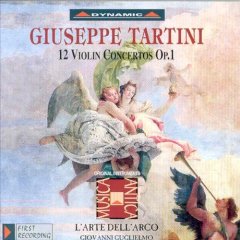Giuseppe Tartini – 12 Violin Concertos (1996)
Giuseppe Tartini – 12 Violin Concertos Op.1 (1996)

CD 1 : Violin Concerto No.1 in G minor, D85 Violin Concerto No.2 in E minor, D55 Violin Concerto No.3 in F major, D60 Violin Concerto No.4 in D major, D15 CD 2 : Violin Concerto No.5 in F major D58 Violin Concerto No.6 in A major D89 Violin Concerto No.7 in A minor D111 Violin Concerto No.8 in A major D91 CD 3 : Violin Concerto No.9 in F major, D59: Violin Concerto No.10 in G major, D71 Violin Concerto No.11 in A major, D88 Violin Concerto No.12 in D major, D18 Giovanni Guglielmo - violin (Nos.1,4,7,10) Federico Guglielmo - violin (Nos.2,5,8,11) Carlo Lazari - violin (Nos.3,6,9,12) L’Arte dell’ Arco Giovanni Guglielmo – director
The violin concertos of Giuseppe Tartini's Op. 1 were composed and issued in the late 1720s and early 1730s , in what might now be called the publication event stretched over several years. They contain elements of the clearly structured Baroque style Tartini inherited from Vivaldi and Corelli, of the more flamboyant virtuoso style familiar from the composer's Devil's Trill, and, often in the finales, of the lighter style of the mid-century. In this selection of five concertos, originally issued in 2003, Australian historical-instrument veteran Elizabeth Wallfisch and Britain's Raglan Baroque Players emphasize the first and to an extent the third of these. Wallfisch's readings are measured, on the slow side, and technically very strong. Where Tartini offers an entire movement that breaks the Vivaldian pattern, such as the fugue inserted into the Violin Concerto in G minor or the bewitching movement simply labeled "Cantabile" in the same concerto, her readings are persuasive. The big Allegro movements are somewhat less so. Tartini's prodigious powers as a violinist and performer were documented early in his life, and these performances don't quite have the flavor of music that began to draw violinists from all over Europe to study with Tartini in Padua. Still, Wallfisch carefully renders the rhythmic breaking-up of the homogeneous Baroque line that Tartini attempted in these concertos, and the crisp strings of the Raglan group sound attractive in the hands of leader Nicholas Kraemer and Hyperion's top-notch engineers. Anyone with a collection of High Baroque instrumental music will enjoy this album and the spirit of freshness in the music it contains. --- James Manheim, Rovi
download (mp3 @320 kbs):
uploaded yandex 4shared mediafire mega solidfiles zalivalka cloudmailru filecloudio oboom
Last Updated (Thursday, 20 November 2014 18:17)








